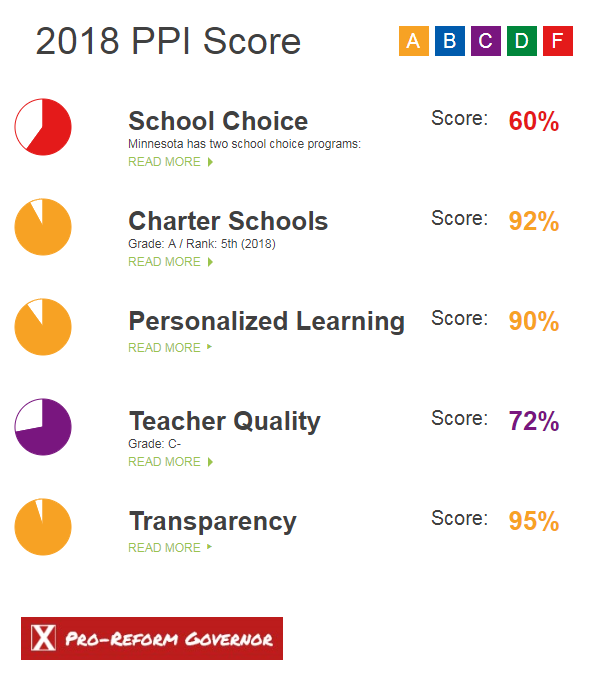Minnesota Gets a ‘C’ in Parent Empowerment
 Does Minnesota empower parents to make education choices that best meet the needs of their child? According to the Parent Power Index (PPI) through the Center for Education Reform, the state scores an average grade overall on giving parents access to impact educational opportunities.
Does Minnesota empower parents to make education choices that best meet the needs of their child? According to the Parent Power Index (PPI) through the Center for Education Reform, the state scores an average grade overall on giving parents access to impact educational opportunities.
The PPI serves as an interactive platform where parents can “discover whether the state affords them due power—and if not, what they can do to get it.”
Minnesota’s Overall Parent Power Index Score: 78%
Minnesota received an overall PPI score of 78 percent. This score is the average of individual scores based on school choice, charter schools, personalized learning, teacher quality, and transparency.
Like its North Star name suggests, Minnesota is truly a stellar state for educational innovation. It was the first state to pass a charter school law, and it is now at the forefront of digital and personalized learning. Minnesota also offers many choices for high school students to access higher education early on. Only a lack of private school choice prevents this star from rising as high as it could.
School Choice Score: 60%
Minnesota currently has two school choice programs: the K-12 Education Credit program and the Education Deduction. Under the K-12 Education Credit program, families can access refundable tax credits “for non-tuition educational expenses like tutoring, educational after-school program, and books.” The Education Deduction allows parents “to deduct educational expenses, including tuition, tutoring, books and more.”
For many years the Center has advocated for real school choice in Minnesota, which would include private and religious schools.
Charter Schools Score: 92%
After passing the first charter school law in the country in 1991, Minnesota continued to support the advancement of the charter school movement in several ways. The state does not cap the number of students who attend charter schools and virtual charter schools are allowed.
But there is still room to improve.
Minnesota allows a variety of entities to act as “authorizers” of a charter school (local school boards, educational district cooperatives, nonprofit organizations, public postsecondary institutions, etc.), but because the state has “recently forced authorizers to regulate schools in a detrimental, top-down fashion…innovation has been suppressed without improving accountability.”
Personalized Learning Score: 90%
The personalized learning score was calculated by considering a state’s approach to an education “that puts the individual at the center of the learning experience.” Higher scores were given to states that promote personalized learning through policies, offer “incentives for districts to experiment with different approaches to personalized learning,” and “put diverse learners and their needs at the center.”
Teacher Quality Score: 72%
With more focus on attracting and retaining effective teachers and exiting ineffective ones, Minnesota can score higher in this area. The score was broken down as follows:
Delivering Well Prepared Teachers: C-
Expanding the Pool of Teachers: D-
Identifying Effective Teachers: C
Retaining Effective Teachers: D
Exiting Ineffective Teachers: D
Pensions: D
Transparency Score: 95%
Minnesota’s transparency score factored in the average person’s ability to view “comprehensive and user-friendly report cards, share information about school options,” etc. Essentially, the state was judged on whether parents can access tools to inform and empower them in their school decision-making.
Governor Score: Not Pro-Reform
Pro-reform governors help ensure parents have power. As a “vocal opponent of charter schools and most paths that veer off the current status quo,” newly-elect Governor Tim Walz did not make the cut as a “pro-reform/opportunity” governor.